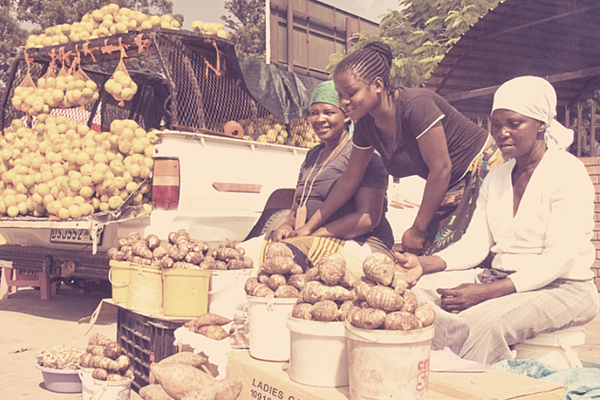Historically, women in South Africa have faced many challenges in the labour market. While women make up 51% of South African society, they are the minority when it comes to leadership positions. Women in South Africa are less likely than women in the rest of Africa to start their own business. There are more women than men employed in the informal sector (47,6% of women compared to 30,6% of men). Key support services, like childcare, are mostly filled by women, and these are the most vulnerable and exploited workers.
Women face many disadvantages in relation to accessing skills, education and training, resources, and networks. There is a great disparity in income too: Caroline Skinner (2019) notes that the ‘hourly earnings in the typical own-account worker in the informal sector are R18 for men and R13 for women’. The self-employed who operate businesses large enough to employ others earn relatively low wages – median hourly earnings among this group are only R25 for men and R16 for women.’ (Skinner, 2019) Around 44% of skilled posts (and better remunerated posts) are filled by women, though this number has seen little change since 2002. In formal businesses 29% of senior roles are held by women, up from 26% in 2014 (Grant Thornton, 2018).
Domestic and clerk work is dominated by women, with only 4% of domestic work occupied by men. Women are considerably less likely to have work-based benefits like unemployment insurance, paid leave, retirement fund contributions and medical aid (Skinner, 2019).
Informal workers are organised, sometimes very locally but increasingly across cities and nationally, for example, by the South African Domestic Service and Allied Workers Union (SADSAWU). The difficulties of organising informal economy workers, including engaging in traditional social dialogue and collective bargaining, where employment relationships are unclear remains a challenge.
The South African Local Economic Development Network (LED) has highlighted the absence of suitable legal and regulatory frameworks for the informal economy. Local governments predominantly address the informal economy through by-laws, resulting in its neglect within official economic development. This gap exposes women to various abuses, particularly by law enforcement agencies and officials who disregard the laws they should uphold. Women in the informal economy also face sexual harassment from government and customs officials but hesitate to report due to fears of further victimisation.
Access to education, lifelong learning and skills development would go a long way in addressing the relatively low levels of formal education and business literacy among women in the informal economy and would assist women in challenging the perception that they are a high-risk group for credit, making it difficult to raise capital for their businesses. Many informal economy workers work under very unfavourable conditions with no proper infrastructure. Women in particular often bring their children along to work with them in conditions where there are no proper shelters, or where no proper toilets, water or garbage collection points exist. Addressing these unsafe and unhealthy working conditions is essential for decent work to prevail.
One way in which informal workers are partially protected is through the Domestic Workers’ Act. The Report on the Status of Women in the South African Economy estimates the number of domestic workers at 1 million and as the largest employment sector for black women (Republic of South Africa, 2015). In South Africa the Domestic Workers’ Act sets out minimum wages for domestic workers and specifies working conditions such as hours of work, overtime pay, salary increases, deductions, annual and sick leave. This can be replicated for other precarious and unprotected forms of work. This women’s month, we advocate for better protection for women’ rights especially in the informal sector, and commend those such as SADSAWU who have worked to improve the lives of many.
Article authors: Dr Salomé Teuteberg and Nina Benjamin







